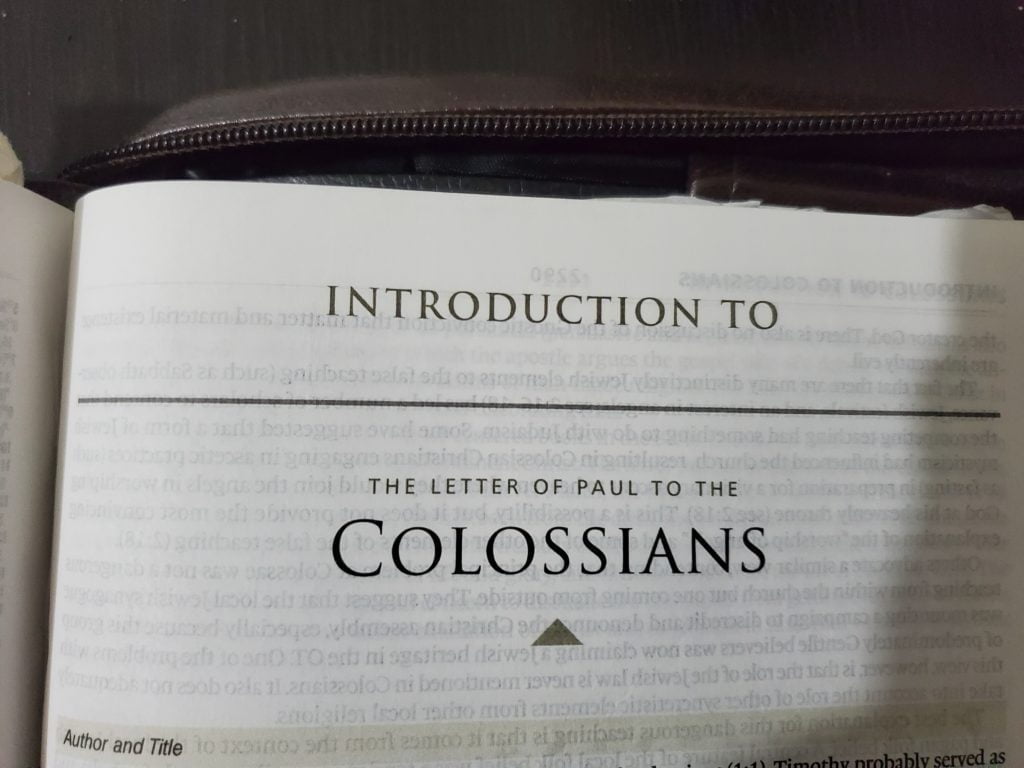⏱️ Estimated Reading Time: 7 min read
As Paul wraps up his teaching portion of the letter to the Colossians, he shifts from the topic of how union in Christ is manifested in the personal lives of believers and in their relationships within the body to their public walk before an unbelieving and watching world. The conduit for this transition is prayer, as the apostle reminds his readers in Colossians 4:2–4 to “continue steadfastly . . . being watchful,” encouraging them to pray that God would open doors and make his message about the mystery of Christ clear and understandable.
Paul’s immediate audience while in prison is rather limited. We know of his penchant for preaching to the guards (Acts 16:30–31) and employing song as a means of proclamation (earlier in Colossians 3:16), so no doubt he continued in both as he labored for the faith while incarcerated. He is able to write letters and meet with those who bring him supplies and messages, but people can’t say, I want you to come hear my preacher Paul and how he explains salvation. So, Paul slips in this little pair of verses to encourage his audience to take Christ’s message of deliverance, freedom, and hope to their audience, to walk through those doors he’s prayed about, and to make their gospel conduct a portal through which the gospel message can be proclaimed.
Colossians 4:5–6 (ESV), “Walk in wisdom toward outsiders, making the best use of the time. Let your speech always be gracious, seasoned with salt, so that you may know how you ought to answer each person.”
These phrases are not mere random afterthought, however. In this missive, Paul gives thanks for the evidences of strengthening, stability, and steadfastness in their walks, and he encourages the church of Colossae to continue, opposing the false teaching that threatens to distract them from their reliance upon the cross alone. He reminds them of the source of their transformed lives and exhorts them to draw upon the knowledge of truth and understanding of the spiritual rebirth they’ve experienced, remembering who they once were and claiming their identity as new in Christ, reconciled in Him, made able to extend love to one another—and to the unbeliever, whom, by the mystery of the ages, may be among those called.
Cross-Minded Conduct
These verses cap the building blocks of all of the teaching that precedes them: Let these truths inform how you relate to the outsider. Paul was devoted to Christ’s mission to go to those who resided outside the camp (Hebrews 13:11–13), where those who had existed for years with the labels of “No Mercy” and “Not My People” (Hosea 1:6, 9–10; 2:23) hanging over their heads, those who were foretold to become one with believing Israel through union with Christ, despite hundreds of years of enmity, now bound together under the flowing blood of the Lamb.
You, Paul says, you are the ones to go to these outsiders, those who are in that place where you once were, lost and condemned, and proclaim the hope found in Christ alone. Who better to walk toward the outsider to explain this mystery of being “in” with Christ than a former outsider? Who better to know that walking in him establishes us in the faith that we proclaim with confidence because it is rooted and grounded and cannot be shaken (Colossians 2:6)? Who better to know that the wisdom and the allurements of the world will fail us? To those who are perishing, the cross is folly, yet it is that very cross that we purpose to introduce to the potential-outsider-turned-insider. We are side-by-side consumers of God’s grace. I’m as dependent upon it as they are, they just don’t see it. Witnessing to outsiders who don’t see may seem like folly, but God in his wisdom chooses for himself the foolish, the weak, the despised and lowly, that they, too, might have the scales fall from their eyes and share in the unsearchable riches of salvation. (1 Corinthians 1:18, 27-28; Ephesians 3:8 ESV)
Cross-Minded Conversation
We are to walk in wisdom toward the outsider, using our time wisely by measuring our words and seasoning them with grace. Like salt, it’s never corrupting, but always restorative. It heals though it may sting as the dead layers of a heart under conviction peel away. Paul uses the modifier always here, and the sentence construct hints that it modifies both parts of the phrase. Always let your speech be gracious. Always season your speech with salt. And always do these two things so that you may be prepared to answer each person.
I always feel pretty good about myself when I have all the right answers, don’t you? The Scripture Star, the Bible Brainiac. But the text doesn’t talk about being a know-it-all. Paul exhorts us to know how to answer each person—each outsider, if you will—as an individual, esteeming each higher than self, conducting ourselves in a manner that is consistent with gratitude and Christlike humility.
What a sneaky intruder pride can be, tempting me to puff myself up rather than give myself away. Better than a platform and a full speaking schedule are the one-on-one opportunities to be transparent and vulnerable with another soul. There are too many times than I care to count that I have succumbed to such “little” temptations like pride and self-reliance. Withholding compassion or secretly hoarding praise for self seems insignificant until we see how they corrupt the soil and spoil the fruit of our labor in God’s vineyard. “Catch the foxes for us,” says Song of Solomon 2:15, “the little foxes that spoil the vineyards.” (ESV)
How do the foxes spread their ruin and wreak havoc on our spiritual gardens so that we have nothing left to give to the outsiders? They gnaw away at our communion with Christ, working first to neutralize prayer by convincing us we can handle this matter just as well on our own. They weaken the cords of unity, which will eventually give way to selfishness, arrogance, self-will, and stirrings of rebellion and lust. They rip through grace with sharp teeth, recklessly spilling seasoning all over the floor so that it loses its savor and preservative strength. We get caught up with trying to contain the chaos, provoking jealousies and division, entertaining speculation and gossip, accusing the brethren, distracted from preparing answers and grumbling about one another and our leaders—all Satan’s devices to disable and disrupt the work of the kingdom.
We spend our time and energy looking inward and cease to care what is happening outside of the camp.
Cross-Minded Prayer
Pride is the disease at the root of a soul that does not bend the heart in prayer. The Concise Commentary on the Bible by Matthew Henry includes this nugget about prayer’s fruit in the Christian life:
“Prayer is heart’s ease to a gracious soul. Prayer will smooth the countenance; it should do so. None will long remain miserable, who use aright the privilege of going to the mercy-seat of a reconciled God in Christ Jesus.”¹
Paul literally begged the Colossians to pray for him that he would speak as he ought. He knew he was not immune to these temptations, and we would be very foolish to think we are. We are weak, and isn’t it usually when we are most content and at rest in our weakness that Christ draws others to wonder at the hope within us? “God allows the pressures of weakness to bear down on us,”² writes Margaret Clarkson, pointing to Paul’s words in 2 Corinthians 1:9: “. . . to make us rely not on ourselves but on God who raises the dead.” (ESV)
Watch out for the foxes. Don’t let conduct or conversation steal away opportunities to proclaim freedom to those enslaved to sin and life to the despairing. Catch them before they build a nest in your heart and cause you to forget how you were once out in the darkness beyond the camp. Drive them out with constant meditation on the cross and resurrection of Christ, the foundation for your hope and the hope of all who believe, and all those outside who will believe but have yet to hear.
- Matthew Henry on 1 Samuel 1:9-18.
- Margaret Clarkson, Grace Grows Best in Winter, Grand Rapids Michigan, WM B Eerdmans Publishing Company, 1984 (thanks to Christina Langella at HeavenlySprings.org)



